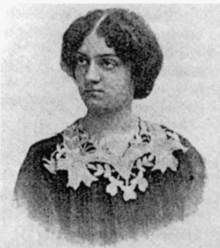Maria Eichhorn (writer)
Maria Eichhorn-Fischer (born November 11, 1879 in Giersdorf, today's Podgórzyn in the Giant Mountains ; died 1930) was a German writer , diseuse and cabaret artist .
Maria Eichhorn became known under the pseudonym Dolorosa (lat. "Painful") above all as an author of erotic poems and prose with a sadomasochistic tendency.
resume
The daughter of a chief forester left her parents' home at the age of 16 and worked as a private secretary in Wroclaw and then as an educator in southern Hungary. In 1899 she came to Berlin, where she lived for the following years. She frequented Berlin bohemian circles and appeared as a cabaret artist and diseuse in cabarets such as the “Silver Punch Terrine” or “ Hungry Pegasus ”, where she performed sultry, sensual poetry and “ dirnenlieder ”.
From 1902 she published poetry and prose as well as translations from French under the pseudonym Dolorosa.
She married the writer Wilhelm Fischer (1878–1963). The time of getting to know each other and getting married is unclear, at least the marriage already existed in 1905. His works (“My Path of Sorrows”, “Sadistic in My Paths of Life” and “A Martyr of Women - Novel of a Marriage on a Flagellantist Basis”), which he published under the pseudonyms Wilhelm Fischer vom Thal , Heliogabal and Wilhelm Eichhorn , presumably reflect autobiographical elements of his married life. However, the marriage did not last: after his separation from Maria Eichhorn, Fischer converted to Catholicism in 1908 and documented his conversion in the book "My return from Luther's special teaching to the Catholic Church" (Berlin 1908). At that time, Maria Eichhorn was probably living in Istanbul. After that, their track is lost. The time and place of her death are not known.
Works

- Confirmo te chrysmate. (Poems) M. Lilienthal, Berlin 1902
- Daffodils (extract from Confirmo ) 1902
- Miss don Juan. (Roman) M. Lilienthal, Berlin 1903
- The strong ones. An athlete novel. Leipziger Verlag, Leipzig 1904
- Corset stories. (Novellas) Leipziger Verlag, Leipzig 1904
- Diary of an educator. (Roman) Leipziger Verlag, Leipzig 1904, online .
- Rafaela. A dancer novel. Leipzig [approx. 1905] and GH Wigand, Leipzig 1919
- The woman sang the troubadour. (Poems) Leipziger Verlag, Leipzig 1905
- Infertility. Leipziger Verlag, Leipzig 1905 and GH Wigand, Leipzig 1919
- The sweet comtess. (Novel) 1907
- The hypocrite. (Novel) 1907
- The sweet comtess. The hypocrite. (Novels) C. Kroll, Berlin 1920
- Raoul le Boucher. (Novel, written 1907) in: Dolorosa: Raoul le Boucher. Fritz Eckerndorf: Theater career. Verlag Weber-Haus, Berlin 1911
Translations
- Emile Laurent: Sexual aberrations. Sadism and masochism. German from Dolorosa. Barsdorf, Berlin 1904
- Jean de Villiot: Sir. Historical novel. Authorized translation by Dolorosa. Dohrn, Dresden 1904
literature
- Albert Eulenburg : A poet of masochism. In: Die Zukunft 41 (1902) pp. 385-388
- Lisbeth Exner: Dolorosa alias Dolle Rosa, writer of masochism and erotic colportage. in: Michael Farin (ed.): Phantom pain. Source texts on the conceptual history of masochism. Belleville, Munich 2003
Web links
- Literature by and about Maria Eichhorn in the catalog of the German National Library
Footnotes
- ↑ Kerstin Pschibl: The interaction system of cabaret - attempt at a sociology of cabaret. (Dissertation) Regensburg 1999. p. 248
| personal data | |
|---|---|
| SURNAME | Eichhorn, Maria |
| ALTERNATIVE NAMES | Dolorosa (pseudonym); Eichhorn-Dolorosa, Maria; Eichhorn fisherman, Maria |
| BRIEF DESCRIPTION | German writer |
| DATE OF BIRTH | November 11, 1879 |
| PLACE OF BIRTH | Giersdorf |
| DATE OF DEATH | after 1908 |
